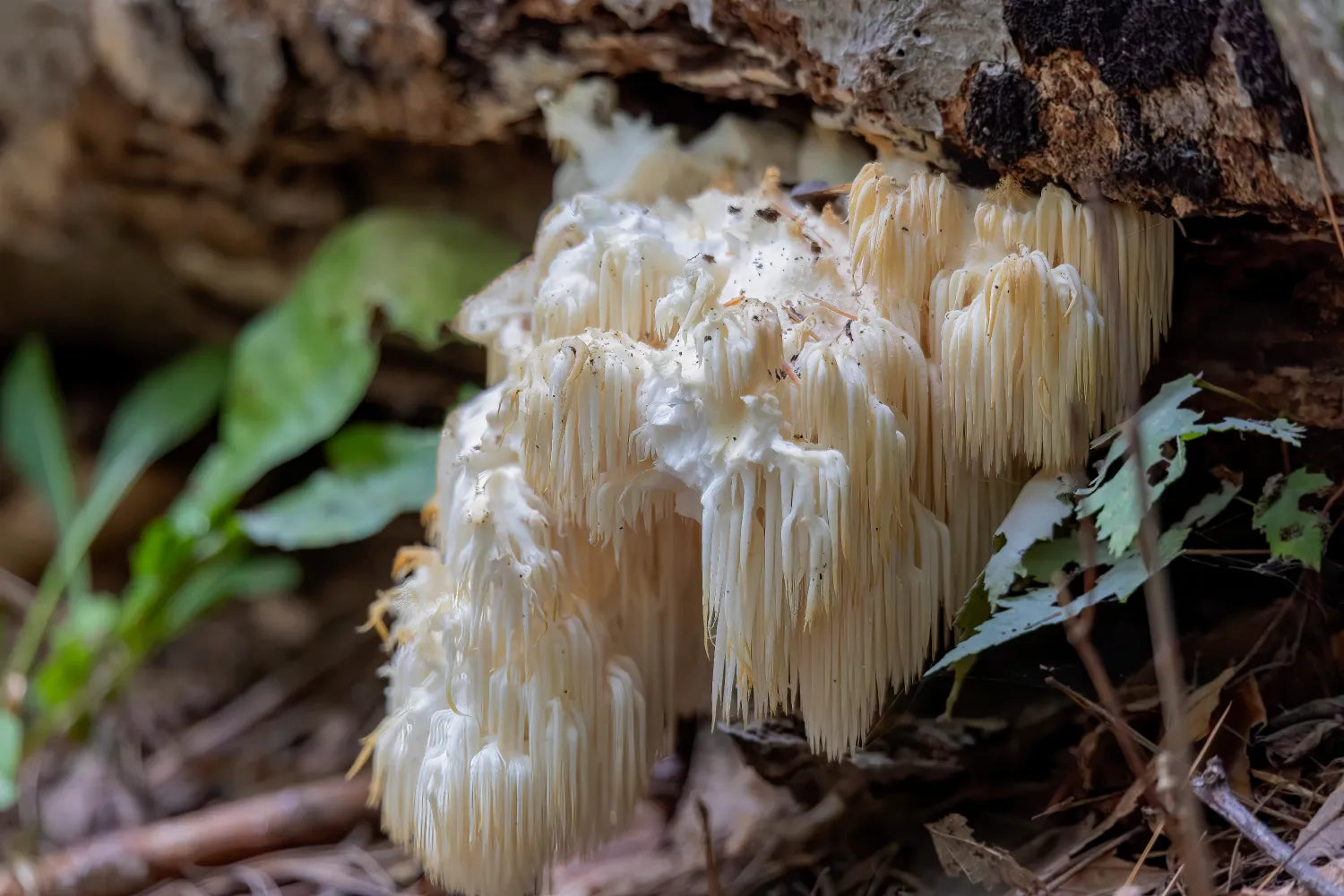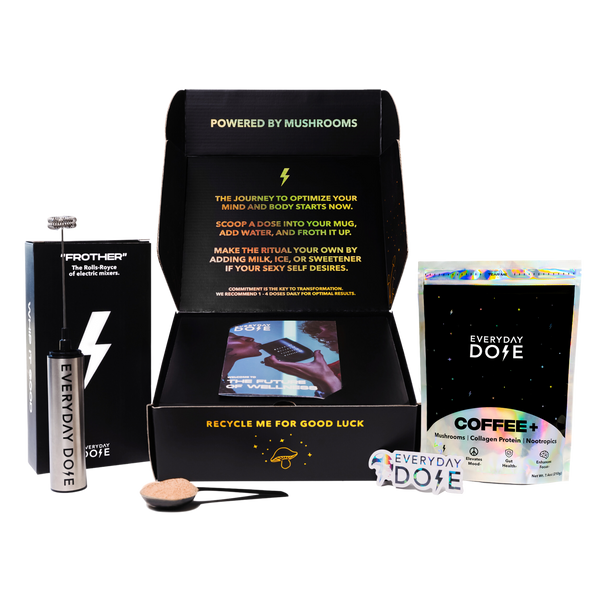Does Lion's Mane Increase Testosterone? Its Impact on Hormones

Between work meetings, spin classes, happy hours, and Netflix binges, there are a lot of things going on that vie for our focus. Many of us turn to supplements like lion’s mane mushroom to help us be mentally present for the moments that matter.
Although lion’s mane can support focus and cognitive health, you may have heard that it can affect testosterone levels. Read on to get the scoop on how this mindful mushroom can affect hormones and how to take it.
What Is Lion’s Mane Mushroom?
Lion’s mane (also known as Hericium erinaceus) is a mushroom that grows primarily in cooler climates. If you know what to look for, you can find this mushroom throughout Northern America, Asia, and Europe.
Some mushrooms like to disguise themselves, but not this one. Lion’s mane is usually bright white and looks furry, which is where it gets its name.
Lion’s mane has been a staple of Traditional Chinese Medicine for thousands of years. In this ancient medical art, lion’s mane was used to support digestion, encourage gut health, and support overall longevity.
As is the case with many folk remedies, science has caught up with tradition. Now, we have studies that shed more light on the benefits of lion’s mane.
These include:
- Supporting a balanced gut microbiome
- Encouraging natural detoxification
- Supports healthy blood sugar levels
- Encouraging focus, clarity, and productivity
- Making way for a good night’s sleep
- Supporting overall mental health
- Providing antioxidant properties
Does Lion’s Mane Increase Testosterone?
Now, on to the information you really want to know: Does lion’s mane really affect testosterone levels?
There is no evidence to support the idea that lion’s mane increases testosterone. You may also see some information on the internet about lion’s mane lowering testosterone, but there’s no research to support this idea, either.
That said, lion’s mane can affect factors that interact with the body’s natural production of testosterone. For instance, sleep quality, blood sugar, and weight can all affect the production of testosterone.
Testosterone is commonly seen as a “male” hormone, and we understand why — after all, it’s responsible for male puberty and controls male fertility. However, women also rely on testosterone (in lower levels, of course) for reproduction and overall hormone health. It’s also one of the keys to building muscle for both sexes. In short, this information isn’t just for men — women should take note, too.
How Can Lion’s Mane Impact Other Hormones?
You might be wondering if lion’s mane affects any other hormones in the body. The effects of lion’s mane on hormones have not been well studied. We’re just now starting to see some very beginning-stage research on how lion’s mane can affect hormones, but so far, these are still animal studies.
Essentially, this means to take the findings with a grain of salt. Even though lion’s mane can have an effect on animals, that doesn’t mean it will impact humans the same way. However, it gives us an overall idea of what we might be able to expect.
Now that we’ve added that disclaimer, let’s dive into the science.
Estrogen
Similarly to testosterone, estrogen is largely seen as a “feminine” hormone because of its role in female puberty and reproduction. In women, estrogen regulates the menstrual cycle, supports a healthy pregnancy, affects mental health, and facilitates healthy skin, nails, and hair. However, levels of this hormone drop considerably during female menopause.
However, men also need estrogen. In men, estrogen helps regulate sex drive, hair, muscle mass, and bone health.
One study looked at the effects of lion’s mane fruiting body in postmenopausal rats. Interestingly, the study found that certain compounds in lion’s mane (like daidzein and genistein) can act as phytoestrogens, which are plant sources of estrogen.
In the study, lion’s mane extract didn’t affect postmenopausal weight gain, but it did show promise when it came to postmenopausal mental health because of its phytoestrogen properties.
Insulin
Insulin is the hormone that regulates blood sugar. When you eat, your digestive system breaks the food down into glucose, which is then circulated in the blood to provide energy throughout the body.
Insulin helps glucose get to where it needs to go — without insulin, glucose can build up in the blood, causing high blood sugars. Normally, we make enough insulin to handle all of our blood sugar. However, some people can develop a resistance to insulin, especially if levels of insulin are constantly high. This means their bodies will need more and more insulin to have the same effect.
A 2013 study explored the effects of lion’s mane extract on mice. The study found that lion’s mane could support healthy insulin levels, as well as healthy blood sugar levels. Insulin can affect many other things, including estrogen and testosterone production, so this can potentially have wide-reaching effects throughout the body.
How Can You Take Lion’s Mane?
If you want to try lion’s mane for yourself, you may be wondering where to start. First of all, you may want to look for a supplement that uses mushroom extract instead of powder. Mushroom extracts contain much more helpful mushroom compounds than powders do, which makes them more powerful.
You may also want to look for extracts made from the mushroom’s fruiting body since most of the research on lion’s mane is done with the fruiting body. At Everyday Dose, our mushroom formulas are made with 100 percent fruiting body extract. In fact, our mushrooms are double-extracted to make sure we get as many of the helpful compounds as we can.
You can try a bitter extract or grainy mushroom powder if you want. Alternatively, you can experience the wonders of lion’s mane by simply drinking a cup of coffee. Our Mushroom Coffee+ blend combines lion’s mane mushroom with chaga mushroom, collagen, L-theanine, and coffee extract to holistically support cognitive and gut health.
The Bottom Line
Lion’s mane is a popular nootropic that can also be used to support gut health and sleep quality. If you’ve heard any rumors about lion’s mane affecting testosterone, don’t get your hopes up — it’s not impossible that lion’s mane may have a secondary effect on testosterone, but we don’t have the research to back up those claims yet.
That said, this mushroom may have effects on hormones like estrogen and insulin. To learn more about the ingredients we use in our mushroom blends, visit the Everyday Dose blog today.
Sources:
The Link Between Sleep and Testosterone | The Sleep Foundation








